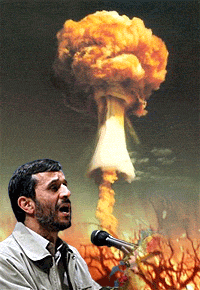Iran still only operating 100s of centrifuges in enrichment program
Iran is still only operating several hundred centrifuges at its uranium enrichment plant at Natanz, despite its claims to have activated 3,000 of the devices.

Iranian President Mahmoud Ahmadinejad announced earlier this week that the Natanz facility had begun "industrial-scale" production of nuclear fuel in a major advance in Iran's uranium enrichment program, which the United Nations has demanded be halted.
Iran's top nuclear negotiator said Monday that workers had begun injected uranium gas into a new array of 3,000 centrifuges, a large jump over the 328 centrifuges known to be operating at Natanz. Iran ultimately aims to operate more than 50,000 of the devices at the site.
But Mohammed ElBaradei, head of the U.N.'s International Atomic Energy Agency, played down the extent of Iran's progress at Natanz.
"Iran is still just at the beginning stages in setting up its Natanz enrichment facility. The talk of building a facility with 50,000 centrifuges is just at the beginning, and it is (currently) only in the hundreds," ElBaradei told reporters in the Saudi capital, Riyadh.
"It has not been demonstrated until now that there are underground nuclear facilities in Iran working covertly, and Iran doesn't have the material that can be used to make a nuclear weapon," added ElBaradei.
But he voiced concern over Iran's nuclear program, saying it was "complicated." He also demanded that Iran show transparency in this issue to reassure the international community that its program was for peaceful purposes.
IAEA inspectors visited Natanz a week ago, and two more IAEA inspectors arrived in the country on Tuesday and are due to view the facility in a few days.
Iran's claims of major progress at Natanz, made Monday, were met by skepticism from international officials and experts, who pointed out that Iran has had difficulty keeping its smaller arrays of 328 centrifuges operating constantly. Experts said 3,000 centrifuges would be enough in theory to develop a warhead in about a year, but they doubted Iran really had that many devices successfully running.
But the announcement was a strong show of defiance to the United Nations, which has imposed sanctions on Iran for its refusal to suspend enrichment and has warned of more to come.
In the enrichment process, uranium gas is injected into cascades of thousands of centrifuges, which spin and purify it. If enriched to a low level, the result is fuel for a nuclear reactor. To a much higher level it can build the material for a nuclear warhead.
The United States and its allies accuse Iran of seeking to develop nuclear weapons, a charge Tehran denies.
ElBaradei expressed support for a common nuclear program that the six members of the Gulf Cooperation Council are considering for peaceful purposes. The Arab Gulf nations announced in December they have commissioned a study on setting up the program.
IAEA plans to send a delegation of experts to the Gulf next month to do surveys and field work for the study, which will look at the feasibility of building the facility, the nature of its peaceful use and ways of ensuring compliance with international safety regulations, said ElBaradei.
The GCC's nuclear bid appears to be in response to Iran's progress in the field. Gulf and other Arab leaders have expressed unease with Iran's nuclear program and worry over the repercussions of a possible U.S. military action against it.
Abdul Rahman al-Attiyah, secretary-general of the Gulf Cooperation Council, called Thursday for a "diplomatic dialogue" between Iran and the international community to put an end to the crisis.
"The only resolution is through dialogue, peaceful solutions and strict compliance with international agreements that ban the use of nuclear weapons," he said.
Subscribe to Pravda.Ru Telegram channel, Facebook, RSS!


